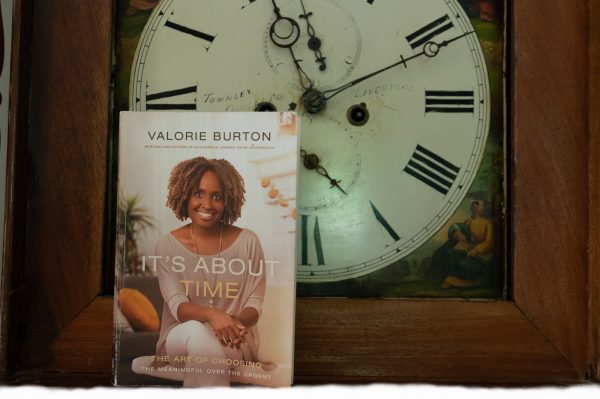Book Review: It’s About Time
by Valorie Burton

24 July 2019 | Theme: Time | 7-Minute Read | Listen
So what causes us (some of us, at least) to try to squeeze in just one more thing? Why do we—I—keep arriving late and still feeling as if the rules of Time somehow work differently for me? I’ve written earlier this month that I thought it was my ego, or a black hole of time, or a rabbit hole, or just the squishy nature of Time. But I missed the mark, and I realized it when I read one key sentence in Valorie Burton’s book…
My intention, many months ago, was to review Carlo Rovelli’s The Order of Time for this month’s theme because I was fascinated by his explanation of relativity. I read the book twice, taking it all in so that I could review it for Do You Mind.
But my First Intention, the one that set me on the path of creating DoYouMind.life, was—and is—to bring forth the wisdom of women—women who may not look like me, worship like me, or even live in the U.S. like me. My intention is to bring forth powerful, diverse women’s voices on a variety of topics that are important to women. So my choice of Carlo Rovelli, as intriguing as I found him, nagged at me.
I found myself once again standing at the bookstore near Brené Brown’s books, when I noticed the spine of It’s About Time just beneath Brown’s books. I pulled it from the shelf and was delighted to see a beautiful woman of color smiling back at me from the front cover. Then I read the complete title: It’s About Time: The Art of Choosing the Meaningful Over the Urgent. Wow! I was overjoyed.
I don’t want to talk about theories and scientific discoveries—well, I do, but not just that—I want to move from the head and into the heart, approaching each topic as it relates to how we live our lives. What is our relationship with Time? How do we struggle, and how can we become empowered? That is what Do You Mind is about!
From the first paragraph, I knew that this was the book for July. Burton begins by describing her own dysfunctional relationship with time (see my July 1 article), and I realized that even though we are two women of different ethnicities and experiences, we have much in common when it comes to the way we relate to Time. I love that!
Early in the book, Burton introduces a worksheet and encourages the reader to stop and think about how she spends each day, each week, and each month—a time budget. I chose to fill in the chart for my weekly time expenditures, and I was pleased that the numbers naturally added up to 168—100% of the hours in a week. Pleased, that is, until I realized that my time budget wasn’t very realistic about time for fun, moodling (listen to my upcoming conversation with Paige Britt over on the podcast channel), or the unexpected. No wonder I always seem to feel so pressed for time!
Throughout the book, Burton uses stories of real women who have faced time challenges. The story of Marie completely struck home for me. When her father needed to have heart surgery, Marie calculated when she should arrive at the hospital to see him before he went to the OR, and decided to attend a business meeting and then go to the hospital. You already know where this is going. She didn’t get to the hospital before he was under anesthesia, and he never made it out of the recovery room. She had chosen a meeting, which seemed urgent, over what was meaningful—seeing her father one last time. She’d made a choice she will forever regret.
As Valorie Burton says, “False urgency steals time from the things that are meaningful.”
We live in a fast-paced society where everything seems to vie for our attention—everything feels urgent: the ticker-tape headlines running across our news programs; the chiming, beeping, and guitar strums of our smart phones; the ceaseless parade of screens in every restaurant and post office; the demands of work and home. And while some things actually are urgent, many of these are false urgencies—they mean very little to us in the long run.
One takeaway I had from the book is just how all these modern “conveniences” have contributed to our being out of sync with the rhythms of nature. Burton traces our shifting perception of time, beginning in the early 1800’s when many people lived in small agricultural communities and lived according to available sunlight, to the man-made pace of today where technology often results in time tyranny. No wonder studies show that women today feel less satisfied with their lives than they did half a century ago. And yet, we keep trying to keep up.
Burton tells of her own experience of thinking she could run a particular errand in a quarter of an hour, and it ended up taking an hour and a half. “Why,” she posted on social media, “did I think I could ‘run into Ikea right quick’ on a Saturday morning?” Her wise friend responded with the sentence that was a game-changer for her—and for me: “Because you are an optimist.”
The Swedish language even has a word for this: tidsoptimism, literally translated as “time optimism.” Seems as if l am not alone in constantly thinking I have more time than I do, or that I can accomplish things in less time than it actually takes. I’m not a procrastinator, rude person, or rotten planner; I’m a tidsoptimist! I consistently fail to factor into account the endless variables that can affect how much time any given activity will take. What I need is to become more pessimistic about time, and then plan accordingly.
My final takeaway from It’s About Time is the idea of creating a time budget. I’m still working on mine, but when I laid out all the things I want or need to do daily, weekly, and monthly, I discovered a huge time deficit. There’s no way I can truly do every activity I want to do and still have time to eat or sleep. I see it now, in black and white: it’s time for Choice Management!
I value my time, and I value your time, Dear Reader. I’ve even begun telling you at the top of each article just how long you can expect to take to read it. If you struggle with Time, I encourage you to read Valorie Burton’s book—it is well worth the time you’ll invest!
Until next time,

If you enjoyed this article,
please share on social media!
NEXT ARTICLE

A Conversation With… Paige Britt
27 July 2019 | Theme: Time | 2-Minute Read
It’s always amazing to sit down for a conversation with Paige Britt! In this episode, we are talking about Time. Paige grew up in a small town in Texas with her nose in a book and her head in the clouds. She studied journalism . . .